This content is sponsored by Greenbrook TMS.
While we are weathering the COVID-19 pandemic, you may be thinking now is not the time to explore options for treatment-resistant depression. But we believe you deserve to feel better, and we have eight reasons why you shouldn’t wait to get the help you need.
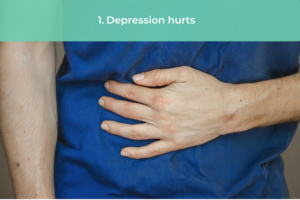 Depression hurts. You probably know that depression can hurt your emotions, but did you also know that it can cause physical pain and suffering? Depression is known to cause chronic joint pain, limb pain, back pain, gastrointestinal problems, tiredness, and sleep disturbances. If your depression goes untreated, these physical symptoms can actually make your depression worse.
Depression hurts. You probably know that depression can hurt your emotions, but did you also know that it can cause physical pain and suffering? Depression is known to cause chronic joint pain, limb pain, back pain, gastrointestinal problems, tiredness, and sleep disturbances. If your depression goes untreated, these physical symptoms can actually make your depression worse.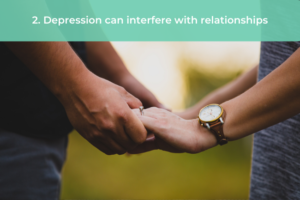 Depression interferes with relationships. Interpersonal relationships are some of the most cognitively intensive tasks people can engage in. Long-term friendships or romantic relationships require a variety of emotional regulation and cognitive framing skills. When you’re depressed, your communication can become cloudy and your patience can shorten, leading to unnecessary relationship demise.
Depression interferes with relationships. Interpersonal relationships are some of the most cognitively intensive tasks people can engage in. Long-term friendships or romantic relationships require a variety of emotional regulation and cognitive framing skills. When you’re depressed, your communication can become cloudy and your patience can shorten, leading to unnecessary relationship demise.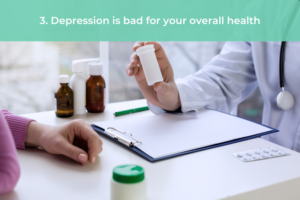 Depression is bad for your overall health. Depression is associated with an increased risk of diabetes, heart disease, some cancers, and an overall increase in mortality. In fact, it can drastically decrease life expectancy by a decade or more, and 30 percent of patients with treatment-resistant depression attempt suicide at least once during their lifetime.
Depression is bad for your overall health. Depression is associated with an increased risk of diabetes, heart disease, some cancers, and an overall increase in mortality. In fact, it can drastically decrease life expectancy by a decade or more, and 30 percent of patients with treatment-resistant depression attempt suicide at least once during their lifetime.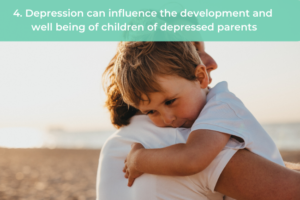 Depression can influence the development and wellbeing of children of depressed parents. Families are complex systems where each person in the family can impact everyone else. One parent suffering from depression can impact the parenting style of the other parent. A parent with a history of depression can cause an increase in the risk of emotional and behavioral problems in their children.
Depression can influence the development and wellbeing of children of depressed parents. Families are complex systems where each person in the family can impact everyone else. One parent suffering from depression can impact the parenting style of the other parent. A parent with a history of depression can cause an increase in the risk of emotional and behavioral problems in their children.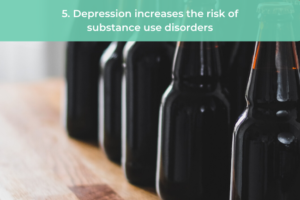 Depression increases the risk of substance use disorders. Often when someone is depressed, they will turn to alcohol or drugs to feel better, which can lead to a substance use disorder. The cost of excessive alcohol use or illicit drug use can be catastrophic, interfering in all facets of a person’s life, and often resulting in serious legal consequences. Also, while people may temporarily feel better during intoxication, the continued use of substances can exacerbate underlying symptoms of depression.
Depression increases the risk of substance use disorders. Often when someone is depressed, they will turn to alcohol or drugs to feel better, which can lead to a substance use disorder. The cost of excessive alcohol use or illicit drug use can be catastrophic, interfering in all facets of a person’s life, and often resulting in serious legal consequences. Also, while people may temporarily feel better during intoxication, the continued use of substances can exacerbate underlying symptoms of depression.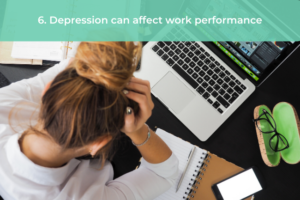 Depression can affect work performance. Depression can cost the global economy hundreds of billions of dollars per year. Approximately half of that is associated with work absenteeism and poor work performance. Pushing through the symptoms of depression is like building a house with a broken arm—without treatment, your work will not be anywhere near its best.
Depression can affect work performance. Depression can cost the global economy hundreds of billions of dollars per year. Approximately half of that is associated with work absenteeism and poor work performance. Pushing through the symptoms of depression is like building a house with a broken arm—without treatment, your work will not be anywhere near its best.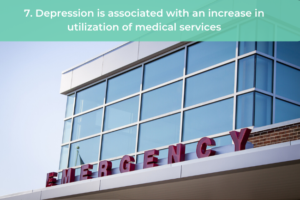 Depression is associated with an increase in utilization of medical services. Because depression is associated with worsening of other medical conditions, patients with depression have increased use of medical services including the emergency room. Besides the cost burden, now, more than ever, depression should be treated in an outpatient setting to reduce the risk of accessing the emergency room—it’s less expensive, less resource-intensive, and safer during the COVID-19 pandemic. However, anyone who has a mental health emergency should access emergency medical services.
Depression is associated with an increase in utilization of medical services. Because depression is associated with worsening of other medical conditions, patients with depression have increased use of medical services including the emergency room. Besides the cost burden, now, more than ever, depression should be treated in an outpatient setting to reduce the risk of accessing the emergency room—it’s less expensive, less resource-intensive, and safer during the COVID-19 pandemic. However, anyone who has a mental health emergency should access emergency medical services. Get help if you have depression. Depression is not a weakness but a real disease that requires medical treatment. Fortunately, many treatment options are available for depression, including the non-invasive, FDA-cleared, non-drug option of Transcranial Magnetic Stimulation, or TMS therapy. Greenbrook TMS is here for you. Get help for your treatment-resistant depression today by scheduling a consultation with a member of our care team.
Get help if you have depression. Depression is not a weakness but a real disease that requires medical treatment. Fortunately, many treatment options are available for depression, including the non-invasive, FDA-cleared, non-drug option of Transcranial Magnetic Stimulation, or TMS therapy. Greenbrook TMS is here for you. Get help for your treatment-resistant depression today by scheduling a consultation with a member of our care team.







